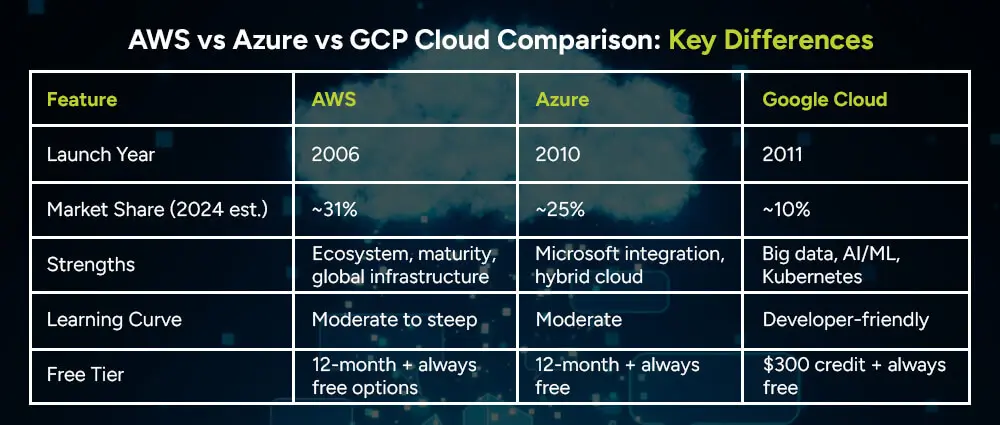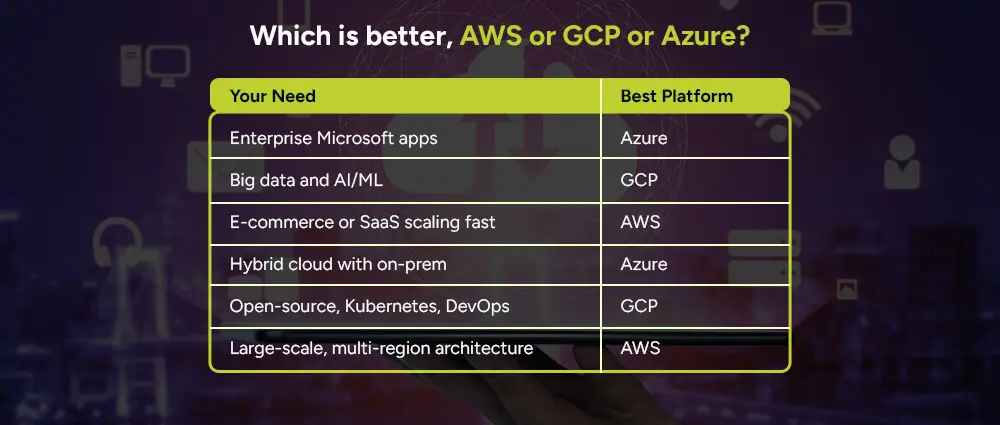When businesses move to the cloud, the most common question is: Which cloud platform should we choose, AWS, Azure, or Google Cloud (GCP)?
Yes, we are aware that it might be difficult to choose between them. All three giants, market leaders in the filed, Amazon Web Services (AWS), Microsoft Azure, and Google Cloud Platform (GCP). They offer powerful tools, scalability, and global infrastructure. But you’d be happy to know that they are not the same. Each platform has its own merits, strategic models, and ideal use cases. The trick is to determine which one works with your business needs and be the most suitable when it comes to expanding it in the global market.
Today, we would, in a friendly and simple way, present you with an AWS vs Azure vs GCP cloud comparison covering the major tools, services, pricing, and other considerations that may help you arrive at a correct decision for your business in 2025.
Amazon Web Services (AWS) is the oldest and most widely adopted cloud platform in the world. Launched in 2006, it offers over 200 fully featured services, from computing, best cloud backup services and storage to databases, web migration, machine learning, and analytics.
Why do businesses love AWS for their role in cloud-managed services?
If you’re running an enterprise-level app or need deep customization, AWS is often the go-to choice.
Microsoft Azure entered the cloud cryptography scene in 2010 and has grown rapidly, especially among businesses already using Microsoft products like Office 365 or Windows Server.
Why Azure stands out:
Azure is often chosen by companies that want to extend their existing on-premise Microsoft setups to the cloud. It also gives the benefit of efficient cloud migration costs when it comes to Microsoft-heavy environments.
Google Cloud Platform (GCP), launched in 2011, brings Google’s strong infrastructure, powerful data analytics, and AI capabilities to businesses of all sizes.
Why people choose GCP:
Data people love it for startups, AI-powered apps, and developers who get dirty hands with open-source tools.
If you’re looking to compare hybrid vs. multi-cloud, then we’re pleased to tell you that Azure is known for its hybrid capabilities, but GCP takes the cake when it comes to multi-cloud environments.
Here’s a simplified breakdown of the AWS vs. Azure vs. Google Cloud: key differences:
Each platform shines in different areas. So let’s dive deeper to compare AWS and Azure services to Google Cloud in more detail.

Despite their differences, all three offer similar core services:
| Category | AWS | Azure | GCP |
|---|---|---|---|
| Compute | EC2 | Virtual Machines | Compute Engine |
| Serverless | Lambda | Azure Functions | Cloud Functions |
| Storage | S3 | Blob Storage | Cloud Storage |
| Database | RDS, DynamoDB | SQL Database, CosmosDB | Cloud SQL, Bigtable |
| AI/ML | SageMaker | Azure ML | Vertex AI |
| Container Orchestration | EKS | AKS | GKE |
Whether you’re building an e-commerce platform or an AI-powered SaaS app, these services are foundational. However, GCP leads in machine learning, Azure in hybrid cloud, and AWS in breadth of services.
When your app needs to reach users around the world, global coverage matters.
| Platform | Regions | Availability Zones |
|---|---|---|
| AWS | 33+ | 100+ |
| Azure | 60+ | 140+ (some are still launching) |
| GCP | 40+ | 100+ |
Azure leads in total regions, but AWS has the most mature and stable global infrastructure. GCP is catching up quickly and often performs better in latency for data-heavy services like BigQuery.
Let’s look at some high-level benefits and considerations of AWS, Azure, and Google Cloud for different business scenarios.
Consider if you want proven performance at scale, or if you already use tools like Redshift, Lambda, or S3.
Consider Azure if your business runs on Windows, SQL Server, or Active Directory and wants to transition smoothly to the cloud.
Leverage its advatages if you’re building AI/ML apps, or you want modern, open-source tools like Kubernetes baked in from day one.
The honest answer? It depends on your business needs. What requirements do you have determine the type of cloud service you should choose?
Here’s a quick table for your help, if we stand correct on your business requirements, you’ll easily know which platform to choose for your organization:

Some standout tools unique to each provider:
AWS: CloudFormation (infrastructure as code), Lambda (serverless), SageMaker (AI/ML)
Azure: Logic Apps (workflows), Azure Arc (hybrid cloud infrastructure management), Power BI integration
GCP: BigQuery (analytics), Vertex AI (machine learning), Cloud Run (containers)
Understanding these tools can help you answer, what’s the difference between AWS vs. Azure vs. Google Cloud for your particular use case.
Let’s say you’re a:
Startup building an AI tool → GCP’s Vertex AI and BigQuery shine here
Bank needing secure data governance → Azure offers strong compliance and identity tools
Retail business scaling globally → AWS gives unmatched infrastructure and e-commerce-friendly tools
Choosing between AWS, Azure, and Google Cloud isn’t about picking the “best” one, it’s about picking the best one for your business requirements.
Still unsure? Consider doing a pilot project with Arpatech on each platform, and consult with our cloud consultants to align the best cloud choice with your business goals.
Need help comparing options or migrating to the cloud? Let us know, as a cloud consulting company, we’re happy to help you navigate this decision with confidence.
As of 2024, AWS remains the most in-demand cloud platform, largely due to its early entry into the market, serving as a one-stop source for a wide range of services, and its significant market share. Azure follows closely in the corporate market sector. Meanwhile, GCP is quickly becoming the best one for developers and AI-focused startups.
Yes, in many instances. GCP tends to favor pricing on compute resources, flexible per-second billing, and automatic sustained use discounts. But for companies that need a wider ecosystem of services, AWS may offer better value.
It depends on the sector. AWS is the overall leader when it comes to mass-market services, from startups to large-scale applications. Azure dwells mostly on its enterprise clients and those customers using Microsoft products such as Office 365, SQL Server, and Dynamics.
If we’re comparing all three, AWS, GCP and Azure, then we’ll have to admit that AWS is considered as the best overall as it offers the strongest tools like AWS backup, S3 Glacier, and EBS Snapshots. These tools enable centralized backups across various AWS services. With the help of the S3 Glacier tool, AWS has the ability to ensure high durability (11 nines) and supports cross-region and cross-account backups, making it an extensive choice for many corporations.
When we talk about Azure, its safe to say that its the best when working with only Microsoft workloads. Its services like Azure Backup and Recovery Services Vault are integrated with SQL Server, Windows Server, and other Microsoft tools. This way, we can easily say that Azure excels in hybrid environments through Azure Site Recovery, making backup and migration seamless for Microsoft-based systems.
GCP stands out as the best option for Kubernetes and containerized applications. With tools like Backup for GKE and Cloud Storage, it is optimized for modern app architectures.